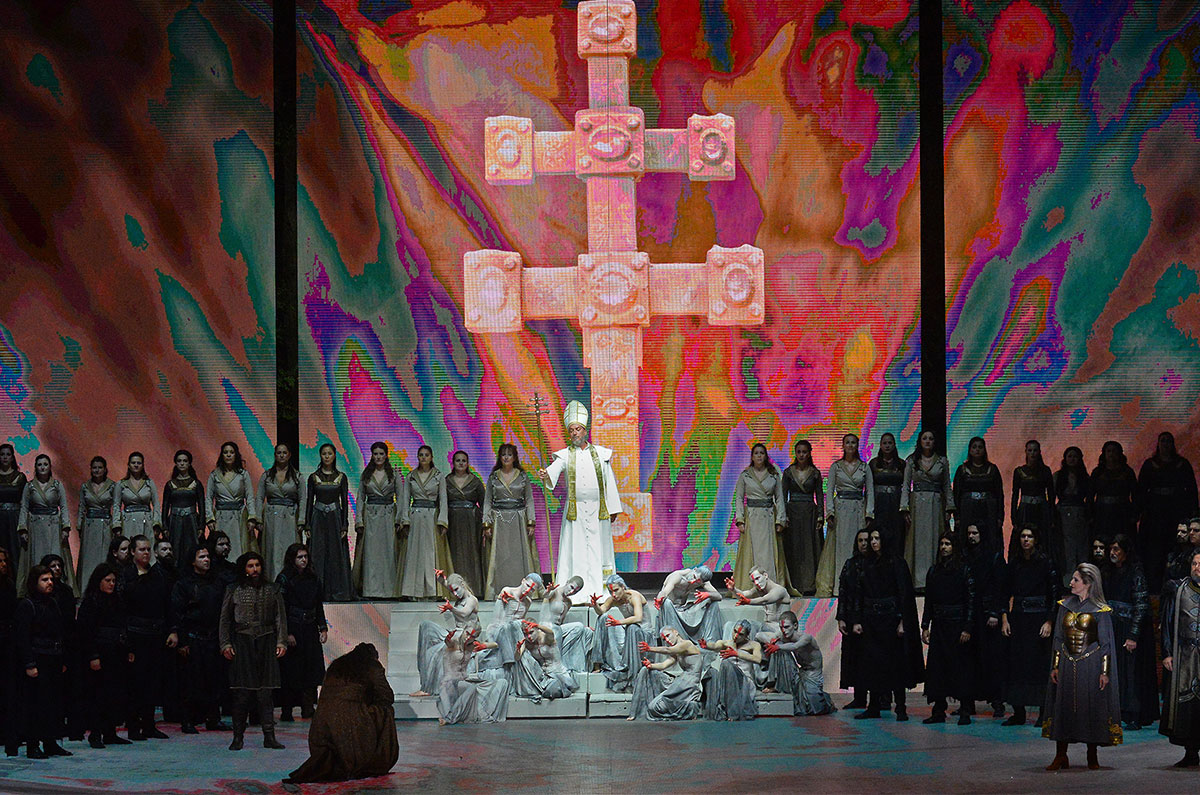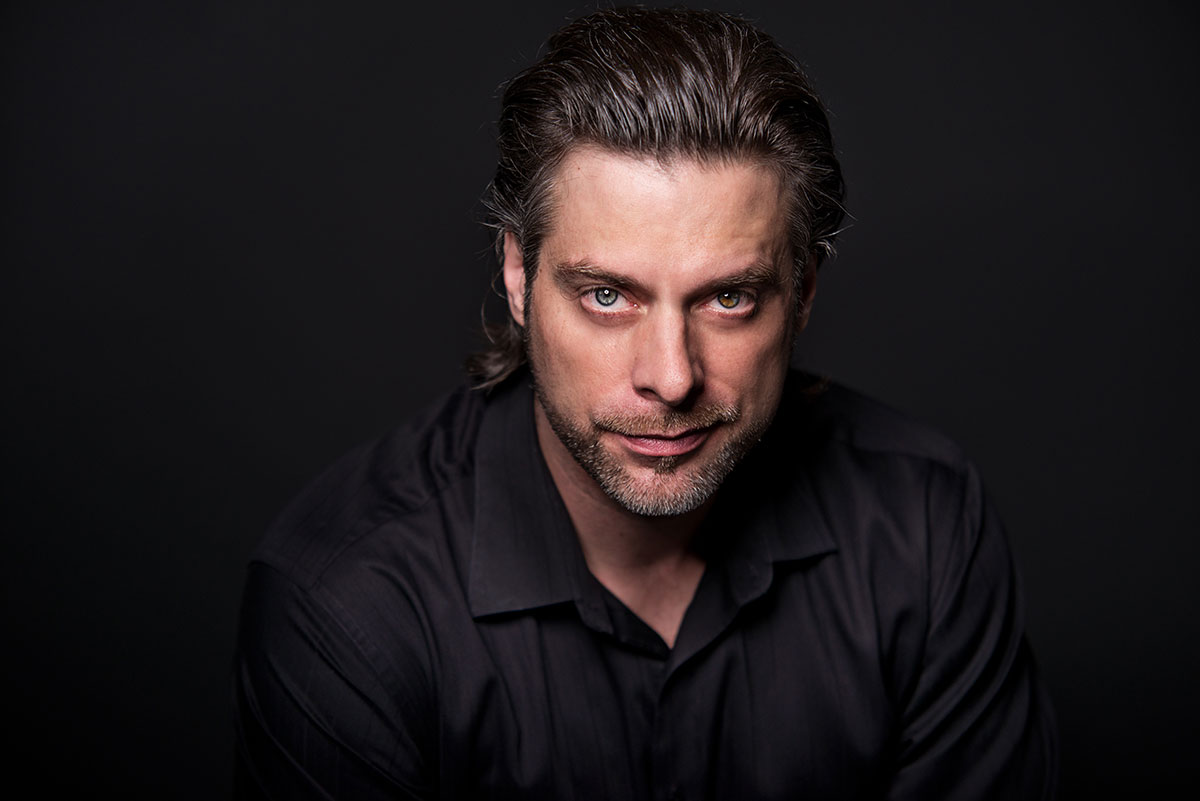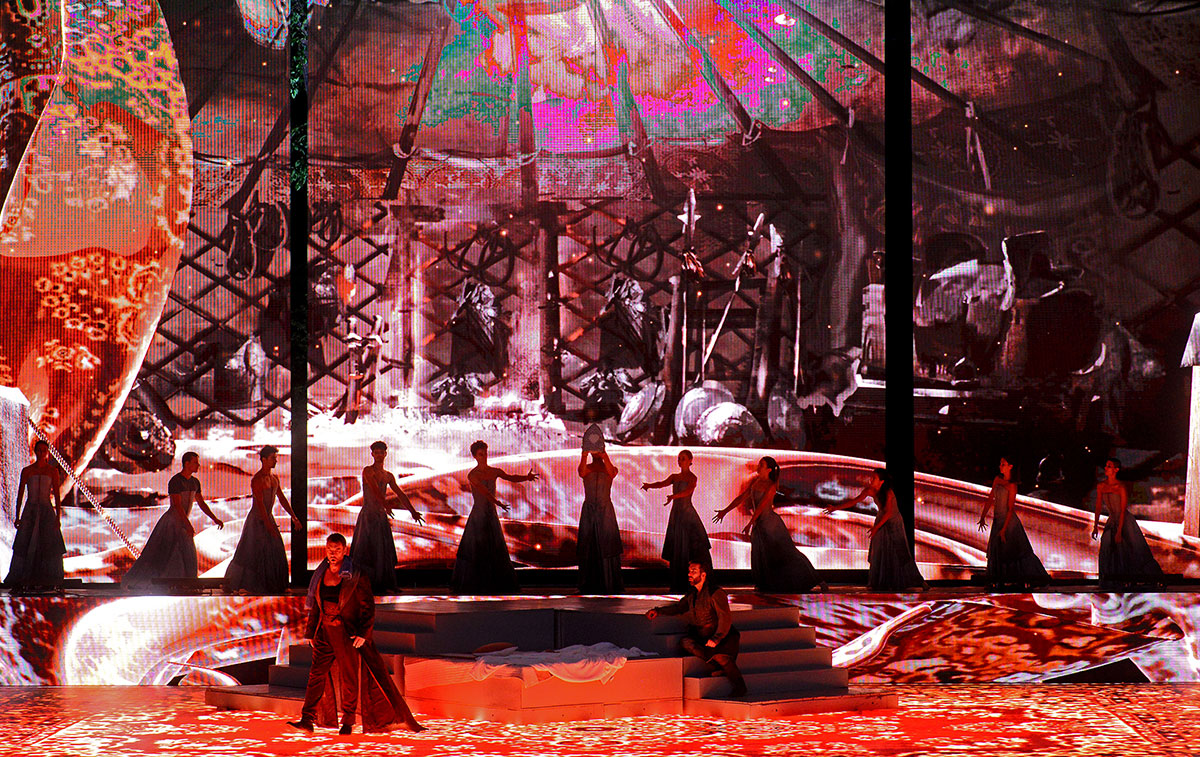
-
Description
-
Cast
-
John Relyea
Giuseppe Verdi:
ATTILA
opera
12 August 2023 at 8 p.m. (rain date: 13 August)
Margaret Island Open-Air Stage
Conductor: Martin Rajna
Featuring the Hungarian State Opera House’s orchestra and chorus
Giuseppe Verdi, the most brilliant of Italian opera's masters, created a fiery, dynamic, complex, and distinct work of art, inspired by Attila the Hun, “the scourge of God”, the most famous of the European Huns’ grand kings. The work’s libretto was written in part by both Temistocle Solera and Francesco Maria Piave. The story is based on Zacharias Werner's 1809 drama Attila, King of the Huns. From the Paris Opera to the Metropolitan, this opera is performed all over the world.

The first performance took place on 17 March 1846, at La Fenice Opera House in Venice. It was first performed in Hungary on 7 July 1972, on the Margaret Island Open-Air Stage. The title role was sung by József Gregor, and the role of Odabella was sung by Éva Marton. The production was directed by Gian Carlo del Monaco and conducted by Lamberto Gardelli.
Now fifty-one years later, the story of the King of the Huns will be revived on Margaret Island this summer with star vocalists and a unique and stunning spectacle. Attila is an authentic work – fiery, passionate, and rebellious – defying everyday expression and conventional forms.
At the Margaret Island Theater in 2023, the title role will be sung by the star of the Metropolitan Opera, the internationally acclaimed bass: John Relyea. In 2023, the lead female role of Odabella will be sung the well-known hungarian soprano Szilvia Rálik.
Her exceptionally virtuoso singing technique, highest artistic quality presented both in Hungary and abroad.
In her repertoire the works of Verdi has an important place. She sing the following roles among others : Verdi: Macbeth – Lady Macbeth, Nabucco – Abigel, Otello – Desdemona
Simon Boccanegra – Amelia, Falstaff- Alice ,Il trovatore- Leonora, Stiffelio – Lina, Un ballo in maschera-Amelia
As the daughter of the fallen ruler of Aquileia, the soprano playing Odabella is immediately smitten with Attila and gives him her sword in recognition of his bravery.
The director of the performance is András Aczél, who has had many successes on Hungarian opera stages. The costumes and sets are made by Kentaur, who has gained international acclaim for his musical theatrical work. The visual and light designs were made by János Madarász, an expert in this field, and the choreography is the work of János Feledi, one of the well-known choreographers of contemporary Hungarian dance.
Attila, king of the Huns: John Relyea
Odabella, the daughter of the king of Aquileia: Szilvia Rálik
General Ezio: Zsolt Haja
Foresto, knight in Aquileia: Boldizsár László
Pope Leo I.: Géza Gábor
Uldino, slave of Attila: Barna Bartos
Huns; people of Aquileia; soldiers and people roman;
Choir: The Choir of The Hungarian State Opera
Libretto:
Temistocle Solera, after Zacharias Werner’s
Attila, König der Hunnen
Conductor: Martin Rajna
Director of the choir: Gábor Csíki
Choreographer: János Feledi
Costume design: Kentaur
Lighting and visual design: János „Madár” Madarász
Creatif consultant: Kata Dobó
Director: András Aczél
Producer, artistic director: Teodóra Bán
John Relyea is one of today's finest basses.
“John Relyea has one of those voices that seem to come from a couple of hundred meters underground. Speaking the Prologue to Bartók’s Bluebeard´s Castle, Relyea had us gasping, so volcanic did it sound”.
Classical Source - Peter Hatfield
John Relyea has appeared on many of the world’s great operatic stages, including the Metropolitan Opera, San Francisco Opera (where he is an alumnus of the Merola Opera Program and a former Adler Fellow), Lyric Opera of Chicago, Royal Opera House-Covent Garden, Paris Opera, Teatro alla Scala, Rome, Naples, Bayerische Staatsoper, Vienna State Opera, Dresden, Madrid, Barcelona, the Mariinsky Theater, and the Canadian Opera Company. His roles have spanned a vast range of repertoire, including the title roles of Attila, Don Quichotte, and Aleko; Figaro in Le Nozze di Figaro and Bluebeard in Bartok’s Bluebeard’s Castle.
Other roles include Zaccaria in Nabucco, Bertram in Meyerbeer’s Robert le Diable, Pagano in I Lombardi alla prima crociata, Raimondo in Lucia di Lammermoor, Colline in La Bohème, Don Alfonso in Lucrezia Borgia, Don Basilio in Il Barbiere di Siviglia, Alidoro in La Cenerentola, Giorgio in I Puritani, Enrico in Anna Bolena, Banquo in Macbeth, Garibaldo in Rodelinda, Méphistopélès in both Faust and Le Damnation de Faust, the Four Villians in Les Contes d’Hoffmann, Marke in Tristan and Isolde, King Phillip in Don Carlo, Caspar in Der Freischütz, Nick Shadow in The Rake’s Progress, Collatinus in The Rape of Lucretia, The Water Sprite in Rusalka and King Renè in Iolanta. In concert, he has performed with major orchestras including the Berlin Philharmonic, New York Philharmonic, Vienna Philharmonic, NDR, London Symphony, Chicago, Boston, Cleveland and Philadelphia orchestra, as well as Atlanta, Dallas, and San Francisco Symphony.
Mr. Relyea has been seen on the stage of the Metropolitan opera in over 240 performances since his debut as Alidoro in Rossini's La Cenerentola in 2000.
Recently he returned to the Paris Opera for Bluebeard’s Castle, and to the Teatro dell’Opera di Roma as Claggart in Billy Budd, his debut at the Teatro di San Carlo as Fiesco in Simon Boccanegra, concerts with the New York Philharmonic, Boston Symphony, Orchestre de Paris, Netherlands Radio Philharmonic, and Sydney Symphony, in Oslo for Billy Budd, Nabucco (concert version) with NTR in Amsterdam, concerts with Orchestra Sinfonica della Rai and Les Huguenots at the Semper Oper in Dresden, Bluebeard’s Castle in concert at the London Philharmonic Orchestra, new production of Hamlet by Australian composer Brett Dean at MET.
In recital, he has been presented at Weill Hall and the Metropolitan Museum of Art in New York City, the Wigmore Hall in London, the University Musical Society in Ann Arbor, and the University of Chicago Presents series.
The many conductors with whom Mr. Relyea has worked with include Harry Bicket, Pierre Boulez, Sir Colin Davis, Christoph von Dohnányi, Gustavo Dudamel, Allan Gilbert, Christoph Eschenbach, Valery Gergiev, Bernard Haitink, Mariss Jansons, James Levine, Lorin Maazel, Sir Charles Mackerras, Sir Neville Marriner, Zubin Mehta, Kent Nagano, Yannick Nézet-Séguin, Sir Roger Norrington, Seiji Ozawa, Antonio Pappano, Sir Simon Rattle, Donald Runnicles, Esa-Pekka Salonen.
He has appeared at the Tanglewood, Ravinia, Salzburg, Edinburgh, Lucerne, and Mostly Mozart festivals, Glyndebourne and at the BBC Proms.
He also remains in high demand throughout the concert world where he appears regularly with orchestras such as the Chicago Symphony Orchestra, Cleveland Orchestra, Philadelphia Orchestra, Boston Symphony Orchestra, New York Philharmonic, Los Angeles Philharmonic, Pittsburgh Symphony, Atlanta Symphony Orchestra, Toronto Symphony, Scottish Chamber Orchestra, the Philharmonic Orchestra, London Symphony, London Philharmonic, NDR Hamburg, and the Berlin Philharmonic.
2022 Saw John Relyea's triumphant and critically acclaimed return to the Metropolitan Opera as the Inquisitor in Don Carlos, as the Ghost/Gravedigger in the North American premiere of Brett Dean's Hamlett, Boris Timofeyitch in Lady MacBeth of Mtsensk, and Sparafucile in Rigoletto
Future engagements: Die Walkyrie at Teatro San Carlo, La Damnation de Faust in concert with St. Louis Symphony, Don Carlo at Royal Opera House.
His recordings include Verdi Requiem (LSO Live) Idomeneo and Clemenza di Tito with Sir Charles Mackerras and the Scottish Symphony Orchestra (EMI), Mahler Symphony 8 with Sir Simon Rattle and the City of Birmingham Symphony Orchestra (EMI), and the Metropolitan Opera’s DVD productions of Don Giovanni, I Puritani, Die Meistersinger von Nurnberg (Deutsche Grammophon) Macbeth and Rusalka (Metropolitan Opera HD Live Series).
Mr. Relyea is the winner of the 2009 Beverly Sills Award and the 2003 Richard Tucker Award.



